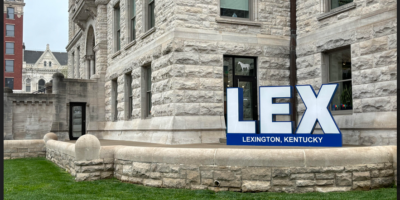Historical markers and memorializing Adolph Rupp
By Jeff Birkenstein
Please forgive my musings on this 18th day of January—MLK, Jr. Day, the first ever with an African American President. I have been thinking recently of the glorious 2000th University of Kentucky men’s basketball win and just how far we’ve come as a nation. Though I no longer live in Lexington, I remember the “historical” sign outside UK’s Memorial Hall:
Adolph F. Rupp (1901-77)
“Winningest” coach in college basketball. Native Kansan who played under famed coach “Phog” Allen. Head coach at UK, 1930-1972. Won 4 NCAA titles, won or tied SEC crown 27 times; coach of 1948 US Olympic team that won gold medal. Natl. coach of yr. 4 times. Never a losing season; 879 wins-190 losses. Nicknames include “Man in Brown Suit” and “Baron of the Bluegrass.”
As soon as I heard that my Kentucky Wildcats had doubled Drexel’s score of 44 and registered their 2,000th win, I knew what was coming next. Sure enough, it soon appeared on my facebook page, from another University of Kentucky alum who is near and dear to me and also now far, far away from the Bluegrass: “…kentucky has the most winningest team in ncaa basketball.” The messages on facebook and articles in the media came fast and furiously.
I was surprised, however, by this particular friend’s use of the word “winningest,” a funny word (MS Word doesn’t even recognize it) and one which brought me right back to Rupp. When I asked her about it, she said she was referencing the phrase commonly used for UK’s basketball team: “most winningest…” She didn’t remember that it was also on the Rupp historical sign.
What’s in a sign?
I have long used pictures of “historical” signs in my classroom, asking my students to ponder what, in fact, it means to be a historical sign. What is history? Old and generic questions, sure, but interesting when applied to specific cases. What responsibilities, if any, come with this sign? And for whom? For instance, most of us understand that Adolph Rupp was one of college sport’s great racists. Not even his sympathetic biographers can avoid the subject. And yet that fact is nowhere on the sign. Should it be? Why or why not? Is it because his racism is not part of what makes him the “winningest”? Is it because such racism (recruiting and respecting only white players and being vocal about it) was common enough back in the day? And, if this fact is not on the sign, can we still call the sign historical? Surely history is not about remembering only the good things. That wouldn’t be history but fantasy. I have long been confused by such gray areas. Not just Rupp’s, but our collective history, as seen through historical signs of all kinds. And now my facebook friend brought me right back to Lexington and to this issue.
Remembering is an ethical act
When I moved to Kentucky in 1996, I quickly fell in love with Lexington and the Bluegrass state, and, once Pitino left (he was never the coach for me), Tubby and the Wildcats. I’ve moved on now; I teach in Washington state. So maybe I shouldn’t even be speaking about Rupp’s historical sign. I don’t know. Maybe I’m just an interloper; some of you will say that I don’t really bleed Kentucky blue. True, I didn’t grow up in the Bluegrass, but I have bled for the team.
When Kentucky won the championship in 1998, I headed down to the intersection of Euclid and Woodland with the masses. I wasn’t drunk that night, but plenty of people were, and openly so, despite the phalanx of horse-mounted Lexington police. I wish I would have been though. I would have suffered a lot less when I stepped on that broken beer bottle shard. It went right through the thin canvas of my Chuck Taylors and sent me to the ER.
God, those are good memories. But how do we process the pride of 2,000 wins with the memory of Rupp’s history? I have long believed the cliché that we are doomed to repeat, or at least continue, that which we forget or won’t discuss.
Still, I think we could never go back to an Adolph Rupp. When I showed a picture of Rupp’s sign in class, a Kentucky blue-bleeding student looked at me and said, “Don’t go there.” It’s a common enough impulse, even an understandable one. But we shouldn’t give into it. In fact, we should retrace our steps on this occasion to see just how far we’ve come and, of course, how far we need to go. In part, this means discussing Rupp’s legacy in the same breath (or article) as the 2,000 wins.
When I moved to Lexington, there was a historical sign outside the courthouse for Civil War hero (or bandit, depending; see, “history” is a bitch) John Hunt Morgan. And there still is. I use this sign in class, too. Interestingly, Russell Rice mentions this same statue in Chapter 16 of his 1994 Rupp biography as a way of introducing the climate in which Rupp moved. But a couple years after I left, another historical sign was added to the (now old) courthouse grounds, a sign explaining that the Cheapside market once sold slaves. When I was still on campus, a historical sign for UK’s first black student, Lyman Johnson, was added. Progress means actively knowing, and discussing often, the past as it happened and not just as the demands of nostalgia would prefer. I am further reminded of the importance of this ongoing remembrance as the new whites-only All-American Basketball League (Google it) makes some noise. I still can’t tell if this is some sort of sick joke, but nevertheless the league represents, even if slimming, a constituency of opinion in this country.
A curious word, winningest. By the numbers, this is true, both for Rupp at 879 and for UK basketball at 2,000. And all Wildcat fans can be proud of this singular accomplishment, even as we consider the historical complexities of it. Though remembering may only be a start, Susan Sontag reminds us that “[r]emembering is an ethical act, has ethical value in and of itself.”
So: elation. And discomfort. We can, and should, be able to revel in them both. Now that’s the winningest…




Jon
“For instance, most of us understand that Adolph Rupp was one of college sport’s great racists.”
Unfortunately, most of those who understand this have never actually known the actual facts and have seen the both sides of the story with regard to Rupp and the question of integration.
The fact of the matter is that the media has done a TERRIBLE job discussing this issue. For someone who is supposedly an outspoken racist, it is interesting that there is not one example of him making such a public comment. In fact, the only public comments Rupp DID make regarding integration etc. have been positive. Not to mention that many of the actions he did (from the 1920’s, 1930’s, 1940’s, 1950’s and beyond were positive with regard to integration, yet for whatever reason the general media has failed to make those things well known.)
Rupp was a very complex person who has been put under a microscope, not because of anything that he did with regard to integration but because he was so successful and for what people think he represents (ie a successful coach from a time period when schools were segregated.) He has been characterized and scape-goated IMO into a one-dimensional punching bag.
To me, those who act like they’re taking a stand for civil rights by piling on Rupp are IMO missing the point by ignoring anyone and everyone else (many who at best did far less than Rupp did in terms of supporting integration). If they truly were interested in looking at the issue of integration in the south during the 60’s for instance, why not look at the numerous others in basketball and in society as a whole ? I forgot, none of them were as successful or make a convenient punching bag as Rupp.
Beyond that, why not look at the issue of integration during the 1950’s, the 1940’s etc. in the North ? They went through some of the very same issues and yet didn’t have to contend with many of the state laws etc. which made it difficult to integrate in the South.
I have looked into this issue in detail and have put together an in-depth discussion of it at the following webpage.
http://www.bigbluehistory.net/bb/rupp.html
It contains some information that might persuade people to think he was racist, while it contains other information that might persuade people he wasn’t. It’s really up to the reader to decide. What it does, however, is sort out what is actually fact and what is fiction with regard to the issue.
BTW, I’m still waiting for any one of Rupp’s critics to read the information and then explain to me why Rupp deserves to be singled out over this issue to the virtual exclusion of anyone else. The fact of the matter is that Rupp did a lot of positive things regarding integration well beyond that of many of his colleagues across the country (including some who have drawn praise for their roles in breaking down barriers.)